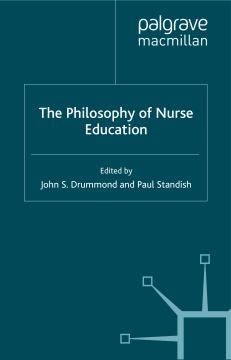
Additional Information
Book Details
Abstract
In recent years, philosophical issues in nursing and health care have become more evident in the academic literature. The Philosophy of Nurse Education covers a variety of philosophical perspectives and enhances ideas of learning, teaching and curriculum design.
JOHN S DRUMMOND is Senior Lecturer in Nursing at the School of Nursing and Midwifery at the University of Dundee, UK. His research includes philosophy, the humanities and social theory applied to nursing and health care. He is co-founder and the current treasurer of The International Philosophy of Nursing Society.
PAUL STANDISH is Professor of Philosophy of Education at the Institute of Education, University of London, UK. He is a leading figure in this field and Editor of the Journal of Philosophy of Education. Previous publications include The Blackwell Guide to Philosophy of Education and The Therapy of Education (Palgrave Macmillan).
'This excellent book aims to marry all these aspects of philosophy, as related to nurse education, and through to professional practice.' - Greta McGough, Nursing Standard
'This is a thought-provoking and distinctive addition to the literature on the philosophy of education, and in particular nursing education, with many of the chapters examining specific aspects of philosophical, ethical and political issues in a way which is accessible and stimulating for the reader.' - Jo-Ann Corbett, London Review of Education
In recent years, philosophical issues in nursing and health care have become more evident in the academic literature. The Philosophy of Nurse Education covers a variety of philosophical perspectives and enhances ideas of learning, teaching and curriculum design.
Table of Contents
| Section Title | Page | Action | Price |
|---|---|---|---|
| Cover | Cover | ||
| Contents | v | ||
| List of figures | vii | ||
| Foreword | viii | ||
| Acknowledgements | x | ||
| Notes on contributors | xi | ||
| Introduction: Philosophical enquiry into education | 1 | ||
| Part 1 Ethics of Education and Practice | 31 | ||
| 1 Nursing and the notion of virtue as a ‘regulative ideal’ | 33 | ||
| 2 Philosophy and health education: The case of lung cancer and smoking | 46 | ||
| 3 Foucault, nurse counselling and narrative therapy | 59 | ||
| Part 2 Profession, Knowledge and Practice | 75 | ||
| 4 Care, sensibility and judgement | 77 | ||
| 5 Practice and its informing knowledge: An Aristotelian understanding | 91 | ||
| 6 Profession and practice: The higher education of nursing | 109 | ||
| Part 3 Curriculum and Expertise | 127 | ||
| 7 The myth of the golden mean: Professional knowledge and the problem of curriculum design | 129 | ||
| 8 Distributed cognition and the education reflex | 143 | ||
| 9 Particularizing the general: Challenges in teaching evidence-based nursing practice | 161 | ||
| Part 4 Politics of Education, Knowledge and Society | 177 | ||
| 10 Little narratives of nursing: Education in the Postmodern University | 179 | ||
| 11 Care of the self in a knowledge economy: Higher education, vocation and the ethics of Michel Foucault | 194 | ||
| 12 Gadamer’s The Enigma of Health: Can health be produced? | 210 | ||
| Suggestions for further reading | 226 | ||
| References | 229 | ||
| Index | 246 | ||
| A | 246 | ||
| B | 246 | ||
| C | 246 | ||
| D | 246 | ||
| E | 247 | ||
| F | 247 | ||
| G | 247 | ||
| H | 248 | ||
| I | 248 | ||
| J | 248 | ||
| K | 248 | ||
| L | 248 | ||
| M | 248 | ||
| N | 249 | ||
| O | 249 | ||
| P | 249 | ||
| Q | 249 | ||
| R | 249 | ||
| S | 250 | ||
| T | 250 | ||
| U | 250 | ||
| V | 250 | ||
| W | 250 |
